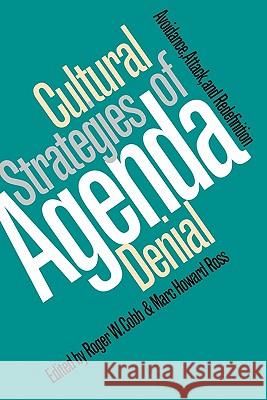Cultural Strategies of Agenda Denial: Avoidance, Attack, and Redefinition » książka
topmenu
Cultural Strategies of Agenda Denial: Avoidance, Attack, and Redefinition
ISBN-13: 9780700608560 / Angielski / Miękka / 1997 / 244 str.
Agenda-setting is a key component in the democratic process if political outsiders are to have their concerns taken seriously. However, their efforts sometimes fail for reasons other than insufficient resources or incompetent leaders: opponents often succeed in keeping new issues from ever reaching the agendas of decision-makers.
This is the first book devoted to examining why some issues proposed by aggrieved individuals or groups are denied access to policy agendas. It develops a theoretical framework for the study of agenda setting and agenda denial, emphasizing the cultural strategies opponents use to impede and defeat policy initiatives, and examining specific strategies of avoidance, attack, and redefinition that explain why certain issues don't receive consideration. The book contains seven case studies that examine the policy process from the perspective of the strategies opponents of policy initiatives use and demonstrate that agenda denial can result when opponents succeed in portraying initiatives as threats to widely held world views and identities. Four cases involving federal agencies show how the Securities and Exchange Commission and the Food and Drug Administration have kept issues off their own agendas, how the accounting profession has avoided SEC regulation, and how pro-life forces kept the French abortion pill off the FDA agenda. Two cases focusing on public health issues examine why national health insurance has never made it onto the federal agenda and how local agencies in Texas prevented residents of minority neighborhoods from obtaining clean water. Finally, a case from outside the U.S. shows how Kurt Waldheim's Nazi past failed to become an issue in his campaign for President of Austria. While most books emphasize issue initiators, Cultural Strategies of Agenda Denial makes a unique addition to the agenda-setting literature by focusing on the actions of opponents and emphasizing the political importance of cultural resources and culturally constituted ideas to the ongoing debate in political science concerning how open and democratic our system really is.










